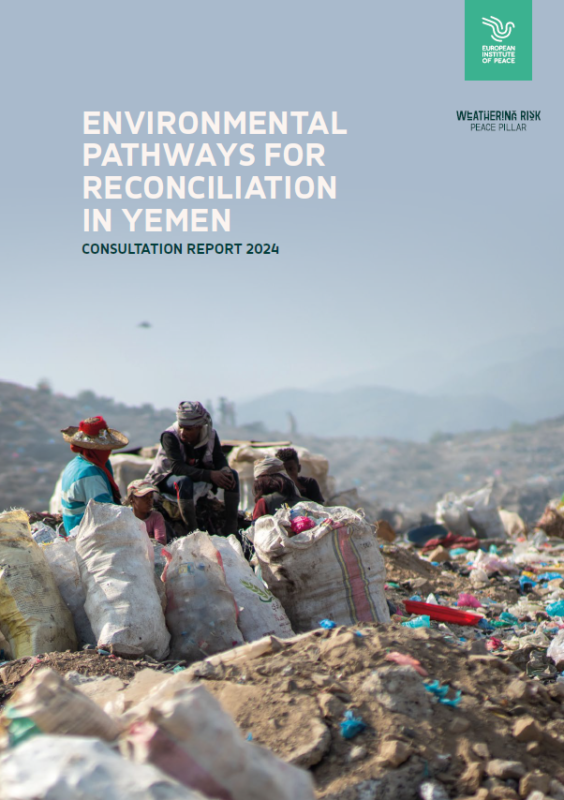Report launch: Environmental Pathways for Reconciliation in Yemen
15/04/2024

The European Institute of Peace is delighted to publish the “Environmental Pathways for Reconciliation in Yemen: Consultation Report 2024”. The report presents the findings of an extensive Environmental Peacemaking Consultation carried out in 2023 with over 2,400 people across the nine Yemeni governorates of Aden, Taiz, Marib, Al-Mahra, Al-Hodeidah, Shabwah, Sana’a, Al-Dhale’e, and Hajjah. The consultation examined the environmental dimension of local grievances and conflict by exploring Yemenis’ perceptions of environmental issues, their impact on peace and security, and existing or potential environmental peacemaking solutions.
Key findings
The results expose, firstly, an urgency to implement conflict resolution and prevention approaches sensitive to the perspectives, needs and priorities of Yemenis in the context of multifaceted climate- and environment-related security risks and the national conflict. Secondly, they highlight unprecedented peacemaking opportunities for conflict-sensitive natural resources management, environmental protection, and climate change adaptation efforts. Key findings include:
- Yemen’s population is highly aware of the impact of climate change in the country, which is being felt across its diverse geographies. While self-reported knowledge about climate change differs across socio-demographic groups, close to 70% of survey respondents acknowledged that climate change impacts their family and community lives. A significant 92% of Yemenis consulted perceived a reduction in the availability of and access to natural resources in the past years, notably in water, gas, and oil. Other environmental risks add to this, including different forms of pollution and extreme weather phenomena. Variations become apparent with a view to government-specific results, urging for tailored programming.
- Tensions and disputes relating to environmental factors are prevalent, often driven by the limited availability of and access to natural resources. More than half of survey respondents indicated that they have experienced or heard of tensions or conflicts in their district in relation to environmental issues. About 25% even reported adverse impacts due to such conflicts escalating into violence. Natural resource scarcity, access, and distribution are widely recognised as a conflict driver throughout the survey sample. Close to 70% of respondents reported tensions and disputes over water resources within their communities.
- Local voices indicate a clear imperative to address environmental risks and related conflicts more comprehensively, including as part of peace efforts. Despite the urgency posed by the impacts of the conflict, humanitarian, and economic crises, 85% of the Yemenis consulted considered it essential to address climate change in the short-term. Furthermore, over 60% of survey participants supported integrating environmental considerations into conflict resolution in Yemen. Local authorities are attributed a pivotal role in addressing environment-related issues but largely remain opaque and unreachable to the local population. Filling this institutional gap, local community initiatives and customary leaders emerge for their important role in tackling environment-related challenges and disputes.
Given the severity of the environmental and climate crisis in Yemen and the impact of the national conflict on governance and provision of basic services, it is no surprise that local institutions are weak, accessibility to those that exist is identified as limited, and local customary and community actors fill the gap for dispute resolution. In this context, rather than a demand for improved environmental governance as a precursor to sustainable peace, the issues identified in this report provide an opportunity to build an approach to environmental peacemaking that engages the agency of those most directly affected by the conflict and the environmental crises. The report provides a basis to inform action that helps build, rather than wait for, accountable governance structures.

Project context
The consultation underlying this report was part of the Environmental Pathways for Reconciliation in Yemen project, which aims to support locally led and sustainable peace by using the environment as an entry point and key element of peacemaking. It engages different strata of the Yemeni society to identify and act upon security issues and conflict risk emerging from the impacts of unsustainable natural resources practices, environmental degradation, and climate change. The project is implemented by the European Institute of Peace with support from the German Federal Foreign Office and is part of the Weathering Risk Peace Pillar led by adelphi.
Read the full report: Environmental Pathways for Reconciliation in Yemen: Environmental Peacemaking Consultation Report


